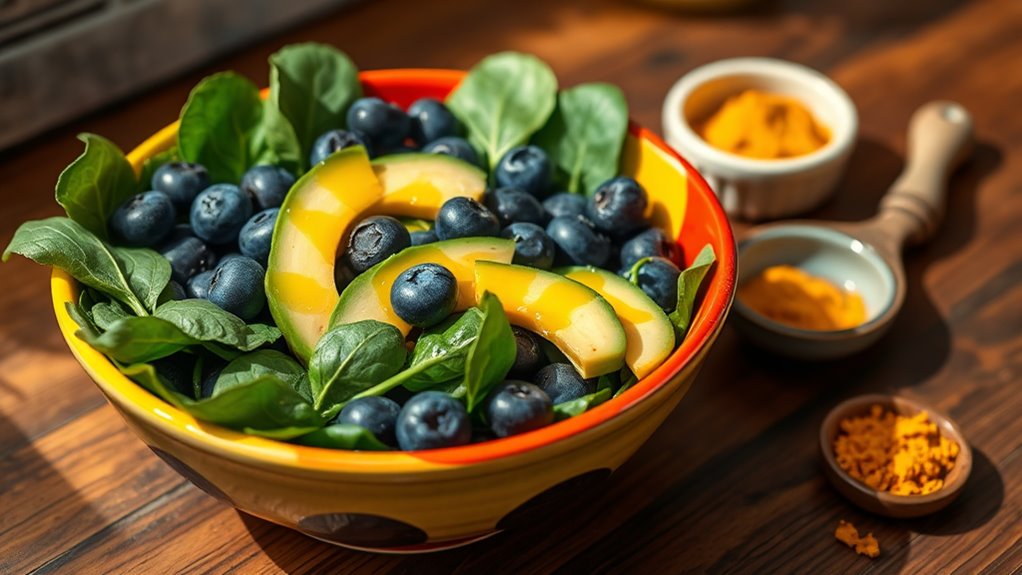What I Eat When My Joints Feel Sore or Stiff
When your joints feel sore or stiff, adjusting your diet can make a significant difference. Incorporating anti-inflammatory foods, such as colorful fruits and vegetables, may help ease discomfort. Lean proteins and healthy fats also play a role in supporting joint health. Consider how hydration, particularly through herbal teas, can further contribute to your well-being. Explore the specific choices that can aid your recovery and enhance your overall quality of life.
Anti-Inflammatory Fruits and Vegetables
When you incorporate anti-inflammatory fruits and vegetables into your diet, you can significantly help manage joint pain.
Foods like berries, cherries, spinach, and broccoli are rich in antioxidants and vitamins that combat inflammation.
An anti-inflammatory diet emphasizes these nutrient-dense options, promoting overall health. Including a variety of these fruits and veggies can be a practical step towards reducing discomfort and improving mobility. Additionally, incorporating easy anti-inflammatory dinners into your meal plan can further support your journey to better health.
Healthy Fats for Joint Health
Incorporating healthy fats into your diet can play a crucial role in maintaining joint health, as these fats help reduce inflammation and support overall cellular function. Sources like olive oil, avocados, and fatty fish are excellent choices. Additionally, including gut-friendly foods in your morning routine may further enhance your overall well-being and digestion. Here’s a simple guide to include these healthy fats in your meals:
| Healthy Fats | Benefits | Sources |
|---|---|---|
| Omega-3 Fatty Acids | Anti-inflammatory | Salmon, walnuts, flaxseeds |
| Monounsaturated Fats | Heart health | Olive oil, avocados |
| Polyunsaturated Fats | Supports cell health | Sunflower oil, fish oils |
| Saturated Fats | Minimal intake advised | Coconut oil, red meats |
| Trans Fats | Avoid completely | Processed snacks, margarine |
Whole Grains vs. Refined Carbs
Healthy fats aren’t the only dietary components that influence joint health; the types of carbohydrates you consume also matter.
Whole grains are rich in fiber and antioxidants, which can help reduce inflammation, while refined carbs may spike blood sugar and worsen inflammation. Choosing whole grains over refined carbs like white bread or pasta can support your joints and overall health significantly. Additionally, incorporating gut-healthy meals into your diet can provide essential nutrients that further promote joint health.
Lean Proteins to Support Recovery
Although many focus on fats and carbs, lean proteins play a crucial role in joint recovery and overall health.
Incorporate these options into your meals:
- Skinless chicken breast
- Fish, like salmon or tuna
- Legumes, such as lentils and chickpeas
- Low-fat dairy, including Greek yogurt or cottage cheese
These proteins provide essential amino acids and promote healing, making them vital for your recovery. Additionally, fermented foods can enhance gut health which supports overall inflammation reduction in the body.
Hydration and Herbal Teas for Relief
Staying hydrated is essential for overall joint health and can significantly alleviate soreness and stiffness.
Drinking enough water helps maintain joint lubrication, which reduces friction. Additionally, herbal teas like ginger and turmeric can provide anti-inflammatory benefits. The soothing properties of ginger lemon tonic can also enhance your hydration routine.
Aim for at least eight glasses of water daily, and consider sipping on these soothing teas for added relief. Your joints will thank you!

